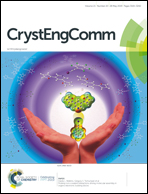Enhanced proton conductivity of a MOF-808 framework through anchoring organic acids to the zirconium clusters by post-synthetic modification†
Abstract
The modified MOF-808 frameworks MOF-808-EDTA/OX show better proton conduction behaviours than the original framework. A high proton conductivity (1.94 × 10−4 S cm−1) of MOF-808-OX can be obtained at 30 °C and 98% relative humidity. This is the first example where proton conductivity is tuned by modifying the metal cluster-based nodes via a post-synthetic modification method.



 Please wait while we load your content...
Please wait while we load your content...